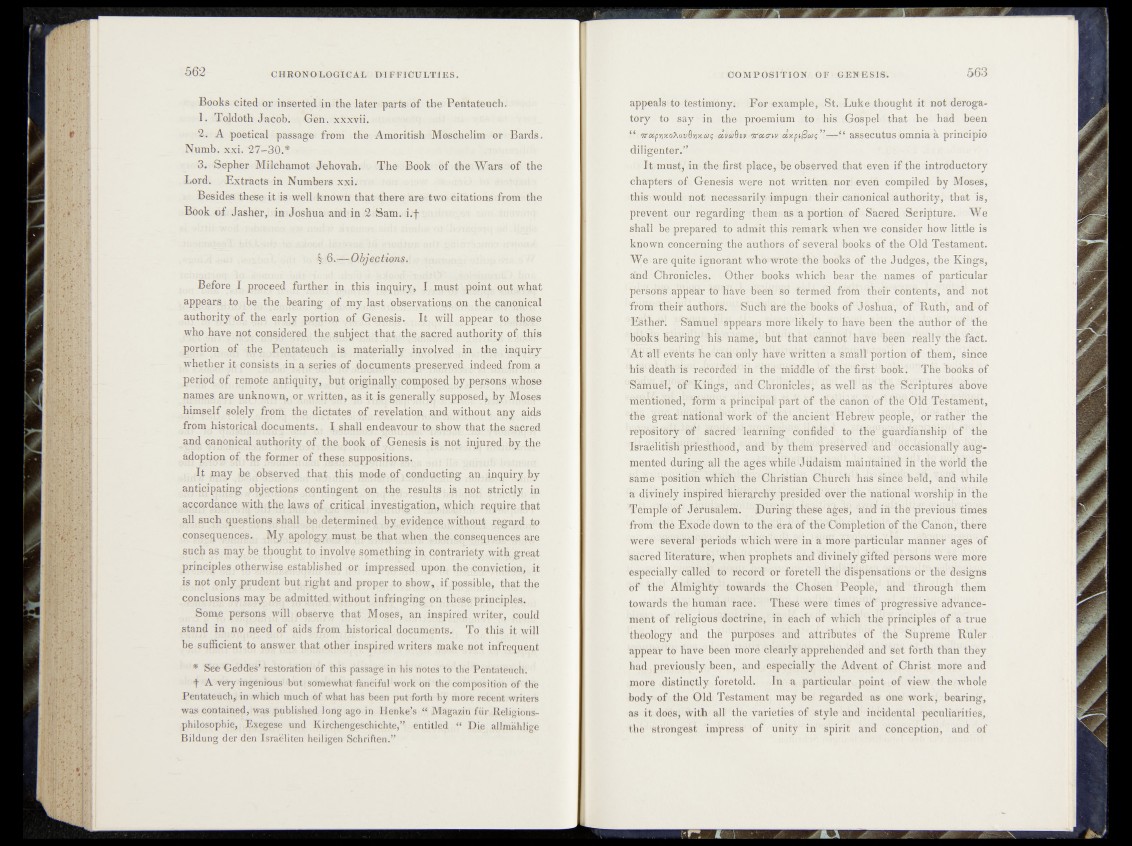
Books cited or inserted -in the later parts of the Pentateuch.
1. Toldoth Jacob; Gen. xxxvii.
2. A poetical passage from the Amoritish Moschelim or Bards.
Numb. xxi. 27-30.*
3. Sepher Milchamot Jehovah.' The» Book (Of the Wars of the
Lord. Extracts in Numbers xxi.
Besides these it is well known that there are two citations from the
Book of Jasher, in Joshua and' in.'2 Sam. i;f i;n
Before ,I proceed further in. this inquiry, I must point oqtyffiat
, appears,, to be the„ Rearing of my lgst observations, op ,thq pgnpmqal
authority >of, tljip qpr|y portion .pf Genesis.k,r, It, >>?il;l appear to^jthose
who have not. considered tbe ^ubjept that fhe ^acre.d aut]jp,rity of, this
portion of thpPeptateuch is materially ipyplyed ,.in,^hq^inqqiry
whether it consists in a peries ,of documents (preseyv,qd i114 e ^ ft,°W'a
period of remote ^nriquifr^ but originally coinnpsed;, bypeffiom i^p^e
names are unknown, or.written, as it is generally supposed, ,|jy(Mqses
himself solely from the dictates of reyelatiop, andyritBQUtj.apy pijds
from historical documents. I.shaU endcaYautitp^ho^ that th&sacred
and canonical apthorjty pf, the book. is not. knuned. byfhe
adoption of ,the former, of, these, suppositions.
It may be observed that, this mode of ^ conducting un.ipquiry by
anticipating pbj^ippp ^ptingept on,.,tbC{ ta. PPt ptondjij in
accordgpce iyith,thc, laws ofvcritical. investigation*
all such questions sbaH bp,determined by eyidepcq,without
consequences.,. My apology ppist be that when „the consequences are
such as may be thought to, involve spmething in contrariety with, great
principles otherwise,^established or impressed upon the conviction, it
is not only.prudent but .right and proper to show, if possible, that the
conclusions may be,admitted without infringing on these,principles.
Some persons' will observe that Moses, an inspired writer, could
stand in no need of gids .from, historical documents,,. To this it will
be sufficient ,tu answer that other inspired .writers make not infrequent
* See Geddes’ restoration of this passage in his notes!fd tlie Pentateuch,
f A very ingenkms: but somewhat fanciful1 work on the composition of th’e
Pentateuch, in which much Of what has been put forth by more recent writers
was contained, was published long ago in Henke’s “ Magazin fiir .Religions-
philosophie, Exegese und Kirchengeschichte,” entitled,“ Die allmahlige
Bildung der den Israeliten heiligen Schriften.”
appeals» to testimony; >Forexample,St. Luke thought it not derogatory
to say >in the proemium to< his Gospel that he had been
fhT&fyfi#tfai!eéïtxiè9&}éóm4iU0ït!i UfcpdSte; assecutus omnia à principio
diligenter.”
It must, in the first-place, be observed that eyen if the introductory
chapters of. Genesis were not written, nort even compiled by Moses,
this would not necessarily impugn; their canonical authority, that is,
prevent our regarding »them as a portion of -Shored Scripture. We
shall be prepared to admit this remark when we consider bow little is
known concerning the authors of several books of the Old Testament.
We are quite ignorant who»wrótë\thfe hodks of the Judges, the Kings,
hnd Ghfonielesi Other books which bear the names of particular
: person s appear iâfJflàvB bebh'- Sd fèfméS firöm Whëir fbntfedts, and not
fft^^feiT'duthbfS:' ^Süëh are the" books df Joshua, of' Ruth, and* óf
E’stheri ^atóuel'ëppéars more likely to have beërf the author of the
ijobkS bekfin^’ffiiS riaffidi, hut that''éaiffiót hMfe béëh ‘rèdîlyfhè fact.
e^éntsfïiG ^ h ;bhiy hafe wiRten^^ffiallportion of themj since
hiS0dèaxh 'is recöt3M;’ in the 'iniddle d ' f he fifsf book. ’The books of
'Sàmh^^bf’K in ^ sàhdt3hfBfiicles; as Well ks ’ffiè Scïiptuiës alkWe
'^ÖntioTOd, fófffik‘aWnhcipals pàrt óf tlWrcafiob.' ofthWöiÖ Testaiöent,
'tttb IpfeuttffidudnafWoff’bfWhë1 ancient HebfëW pëÓ^le,’'df’father the
’fëpÓffifÖxy^bx Sacféd lëâfh&^?‘cöttfidéd1 to thô1'gdàfffiàb^hip '!of ' the
Isfàfélitïsh pifedthbfÖ/ add’' by them°pfëserTCd-add JBcc^oMny âüg-
mented during all the ages while'Judaism mâiritaiüëd îh tliè World the
ëàffiè^position which the'Christian Church 'haWdincB'bèTd, Wna While
a divinely inspired hierarchy presided over the national Worship- in the
Tèdiplé ó f Jerusalem. During these aged) and in the previous times
from the Exodé down to the era of the CompletioWof the Canon, there
were sëthrâl periods whibh were in a more particular manner ages of
sacred literature, when prophets and divinely gifted persons were more
especially called to record or foretell the' dispensations or the designs
óf the Almighty towards the 'ChoUeh People1,l! tid'd through them
towards the human race. These were times o f progressive advancement
of religious doctrine, in ëach óf Which the prihdiples of a true
theology and thé’ purposes and attributes of the ‘Suprènië Ruler
appear to ha've bë'êb mofè Clearly apprehended add Set forth thdd they
had previously been, and especially the Advent of Christ more and
more distinctly foretold!* In a particular pointed view the. whole
body of the Old Testament may be regarded as one work, bearing,
as it does, with all' the varieties of style and incidental peculiarities,
the strongest impress of unity"in spirit and conception, and of